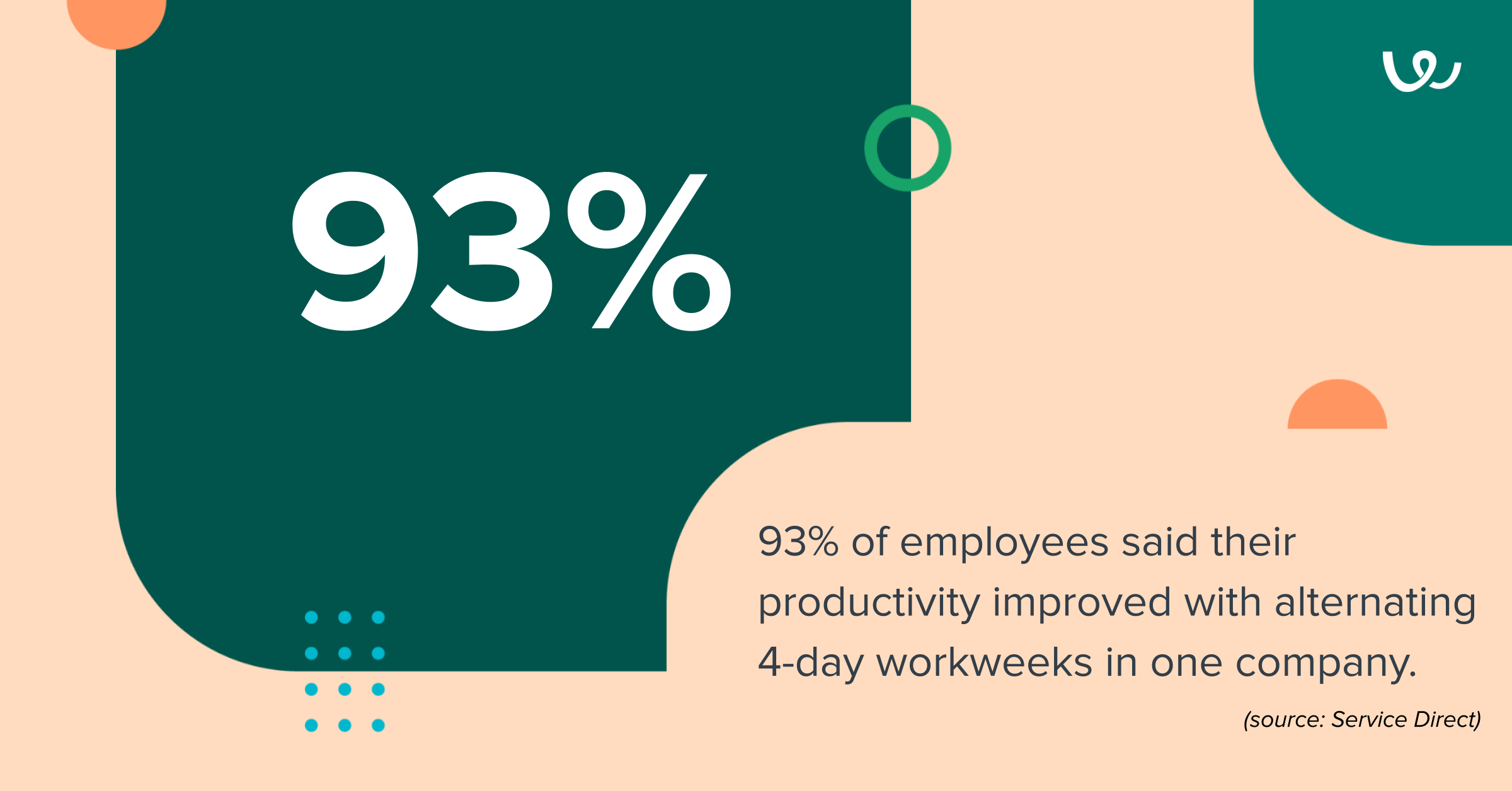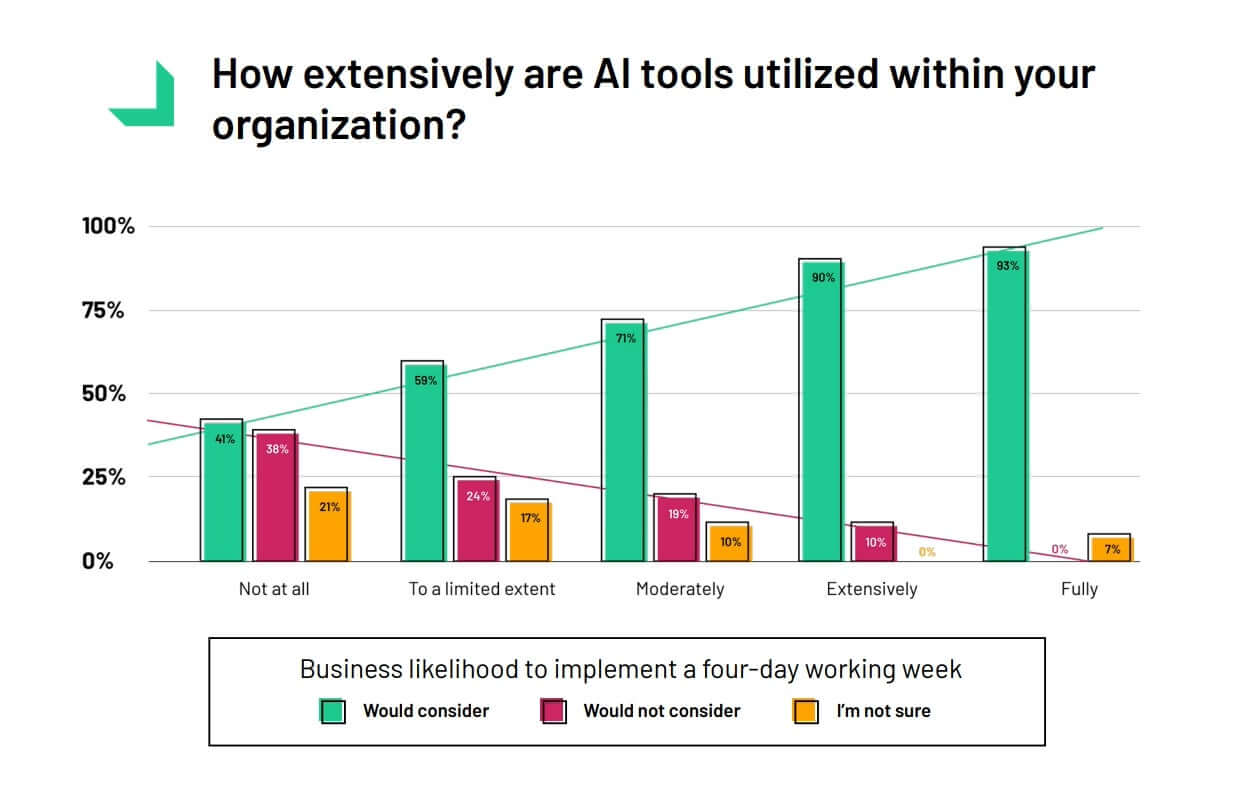Sanders’ 32-hour workweek: what Reddit & employers think
The 32-hour workweek promises enhanced productivity and work-life balance, backed by Bernie Sanders' legislation. Trials show a surge in employee satisfaction, with a significant decrease in burnout and turnover. But is it really all it's heralded to be?

If a company gave you Fridays off, but you were able to keep your current salary, would you do it? Of course you would.
If you were an employer encouraged to do that for your teams? Maybe yes, maybe no.
The topic of the 32-hour workweek – also described as the four-day workweek – is top of mind for those in the business community after US Senator Bernie Sanders presented new legislation calling for a shortened workweek without a reduction in pay.
If passed, any hours worked above 32 in a week would mandate overtime pay.
Contents
Why this and why now?
It’s been a wild year – we’re seeing technology in the form of artificial intelligence becoming a mainstay at work for many, and an increased pressure on higher productivity among workers who are operating in times of austerity. And the logic is that this trend needs to be curtailed before it gets out of hand.
According to the New York Times, Sanders said: “The sad reality is that Americans now work more hours than the people of any other wealthy nation.” He cites data that US workers work far more hours than their peers in other countries including Japan, the UK, and Germany.
“The sad reality is that Americans now work more hours than the people of any other wealthy nation.”
Does Sanders have a point? Let’s get into the conversation.
32-hour workweek: the experiences
Let’s first look at those who have actually done it. Matt Buchanan at Service Direct introduced alternating 32-hour workweeks as a three-month experiment in his own company in 2022, and shared his story with Workable.
The result at Service Direct was mostly positive – all workers wanted to keep it after the trial period ended, 93% said productivity improved and 85% said they felt more rested and happier at work.
Meanwhile, 4 Day Week Global (4DWG) – yes, that’s a real organization – found huge value in a four-day workweek based on trials in a number of countries including the US, UK, Ireland, Australia, New Zealand, and a handful of other countries since its inception as a consultancy to willing parties in 2019.
4DWG found that employee engagement went through the roof, with a 42% decrease in employee turnover and 68% decrease in burnout.
Employees actually want it too according to 4DWG data – with 63% of participating organizations now finding it easier to attract new talent to their open jobs when operating on a four-day workweek schedule.
32-hour workweek – take it or leave it?
But take that with a grain of salt. The Washington Post reports that two thirds of the companies in the UK trial, for instance, had fewer than 25 employees – allowing for greater flexibility in hours than larger, more standardized enterprise organizations.
Also, their willingness to participate suggests they’re already looking to move in that direction.
Additionally, according to WaPo, 90% of the employees involved in the pilot project were White – indicating potential privileges that allow for greater flexibility in this group.
And Reddit, of course, has opinions too
A quick scan of Reddit posts suggests that there’s more skepticism than one might realize. A quick glance at a new thread in the popular online site suggests there’s plenty of support for it – but again, with a healthy dose of skepticism.
For instance, Reddit user gracelyy wrote:
“Of course I love it in theory. In reality people are greedy and don’t wanna pay their workers more, so they’re going to try to find any loophole they can in order to make sure your pay is decreased if you work that 32 hour mandatory workweek.”
“Of course I love it in theory. In reality people are greedy and don’t wanna pay their workers more, so they’re going to try to find any loophole they can in order to make sure your pay is decreased if you work that 32 hour mandatory workweek.”
And there’s more pain than that, too:
“As much as I want it to pass.. it won’t. The entire country needs a major overhaul in order for anything like that to even pass the House,much less end up on anyone’s desk who won’t immediately trash it. And if it does ‘pass’, they’re gonna jack up prices and force a false inflation to account for how much they’re gonna be forced to pay workers. Then all of a sudden you’ll need 5 million to retire instead of 2 mil.. if you do retire.”
Which invited this retort from DetectiveJoeKenda:
“Imagine if all of the labour organizers and workers who fought for the rights we have now thought like you. I’m glad they didn’t.”
Well, it can work, right?
User lostmindplzhelp then shared their past experience with the four-day workweek:
“I had it for a few years before Covid came along. We worked 32 hours but got paid for 40. It was pretty awesome but I saw it as a raise they could take away at any moment, which is what happened once business slowed down and the company had to start minimizing expenses. Now I work 32 hours there, get paid for 32, and work somewhere else on weekends to make up for the lost income.”
But all in all, it’s a nice experience for everyone involved:
“Our company is not very productive so it had no effect on productivity. Having a weekday off was nice. The schedule was staggered so some of us worked Monday-Thursday and some worked Tuesday-Friday and the office could stay open as usual. TLDR it’s pretty cool.”
The almighty dollar has something to say
Money, of course, was a hot topic. For instance, flsingleguy suggests that this is something much needed in the modern working world.
“Wages in the U.S. have stagnated since the early 1970s. Between 1979 and 2020, workers’ wages grew by 17.5% while productivity grew over three times as fast at 61.8%. The 32 hour workweek would be an effective way to bridge that gap and give people the time they really need in this crazy world.”
But it’s not always feasible
Wages are nice, but employers have their own needs, according to bklynboyz2, who wrote:
“How about a 5 hour week? One hour week? 10 minute week? You do know companies need to make money if you expect same pay with less hours? Then you complain WAH WAH I am not paid enough!”
“Who is gonna force employers to pay 20% more? Without repercussions?”
Mooblegum also pointed to the downsides of a four-day workweek in this comment in another Reddit thread from four months earlier:
“Like always, it will be more people without jobs and the rest working full time or even overtime. It is like this in my country in France, many have no jobs but the government just decided to make people work until 64 (it was 62 until now).”
The role of AI in the four-day workweek
We mentioned the role of artificial intelligence above as a reasoning for Sanders’ new legislation. There’s a huge reality there.
Data from London-based news-and-events resource Tech.co collected in late 2023 shows it. In their 2024 Impact of Technology on the Workplace study, which surveyed more than 1,000 business leaders, they found that 29% of businesses on a four-day workweek use AI extensively in their work processes – this includes ChatGPT and other programs to support overall operations.
On the flip side, just 8% of those on a standard five-day workweek use AI to the same extent.
The correlation between AI-driven productivity and the propensity for a four-day workweek is clear:
Closely related is that nearly three out of four (72%) of businesses experienced higher productivity with heavy use of AI in work processes.
So does this mean organizations can do more with less when using AI – and therefore are able to shift to a four-day workweek without a loss in productivity?
The answer is a resounding yes, with 93% of business leaders at AI-focused companies either considering or having already introduced a four-day workweek in their overall business strategy.
But does it work in the real world?
Again, there are many opinions on this at Reddit. Users like PmMeYourBeavertails, were quick to point out the impracticalities of a four-day workweek in terms of time investment and resources:
“How would a 32 hour week work for manual labor? You can’t check out 40 hours worth of customers in 32 hours. Stores will have to hire someone else to cover those 8 hours, resulting in price increases. You also can’t see 40 hours worth of patients in 32 hours, or wait 40 hours worth of tables. Wanna build a house? That’s now gonna take you 20% longer or will be 20% more expensive.”
‘More for less’ will hurt workers
Workable’s AI in Hiring & Work survey report for 2024 finds that workers are more efficient in their jobs when using AI – with three in four workers (75.7%) saying AI has enhanced productivity in their day-to-day work by a little or by a lot.
But is that a good thing? Not necessarily.
For instance, DumpTrumpGrump suggested in the previous Reddit thread that there’s other motivations for employers using AI that may not be so beneficial for employees:
“[Companies] will just hire fewer workers and expect higher productivity out of the ones they do hire. I’m using AI every day right now and comfortably doing the job of 3-4 people right now which is only possible because (1) the work I’m doing for jobs normally outside my specific hired role can be greatly assisted by current AI options and (2)! there’s no one else in the company who can adequately do you those roles nor budget to hire for them. When budget [becomes] available, I [expect] we will hire someone who is only working 15 hours per week but still gonna be expected to show up every day.
And “getting more done with less” continues to be a point of contention:
“Eventually you’ll start seeing the consolidation of jobs. For example a marketing job might end up doing all ad spend, SEO, SEM, content / copy creation and design (web and graphic) whereas most mid-sized companies would split those roles into 3 or 4 roles today.”
Everything old is new again?
Another user, radio_gaia, lamented that the whole AI-driven work environment is just another reflection the same old, same old:
“We’ve heard this before albeit not about AI. Same capitalism model will kill this dream again. The best thing an individual can do is build a skill set that has more demand than supply to be able to earn enough to live and work less hours if they choose to do so. It’s always the same.”
32-hour workweeks may be here to stay
Whatever people think or don’t think, it seems that the trend is heading in that direction anyway. A report from the UK-based think tank Autonomy predicted that by 2033, 28% of the total workforce in the UK would be working in the four-day workweek and 88% of the workforce would see working hours reduced by 10%. Again, a correlation between the integration of AI and the standardizatio of four-day workweeks.
The end result? Quality of life increases for workers. That’s one of the reasonings behind Sanders’ proposed legislative change.
That’s the hoped-for end game for many. But will worker happiness and better health be the end result? We will have to see.
Frequently asked questions
- What is the 32-hour workweek?
- It's a proposed work schedule where employees work for 32 hours across four days without a reduction in salary. Bernie Sanders' legislation aims to standardize this, requiring overtime for hours beyond 32, aiming to improve work-life balance and productivity.
- Why is the 32-hour workweek gaining attention now?
- Amidst rising AI integration and demands for higher productivity, the 32-hour workweek offers a solution to overwork and burnout. It's a response to the need for a better work-life balance, with Sanders highlighting that Americans work more hours than peers in other wealthy nations.
- What are the benefits of a 32-hour workweek?
- Companies that trialed the 32-hour workweek reported a 42% decrease in employee turnover, a 68% reduction in burnout, and improved employee happiness. It also makes organizations more attractive to potential employees, with 63% reporting easier talent attraction.
- What challenges does the 32-hour workweek face?
- Skepticism remains among employers and certain sectors due to concerns over feasibility, especially in roles that can't easily compress work hours. Critics worry about economic implications and the potential for increased operational costs.
- How does AI factor into the 32-hour workweek?
- AI's role in enhancing productivity makes the 32-hour workweek feasible, with companies using AI extensively finding it easier to adopt shortened workweeks. 93% of business leaders at AI-focused companies are considering or have introduced a four-day workweek.






